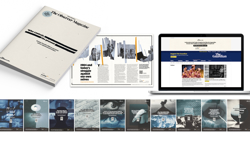
In 2016, you could argue that improving research – providing incontrovertible data to prove everything from dwell time to context across multiple platforms – was a great opportunity for the national newspaper industry.
It could have been done faster but it was done.
A year later, it was reasonable to argue that whilst boosting online revenues was vital, taking “a step back to the future” by putting more effort into shoring up print circulations from where most advertising revenues still flow, was an opportunity.
The power of print is now more valued and there has not been a rush towards online-only publishing – not least because the latest research shows just how great The Independent’s loss of impact has been following the passing of its print edition.
Last year, it was perfectly plausible to see opportunities for established publishers in the rising pressure against Trump “fake news” and the dangerous anti-social material disseminated by the California tech companies, particularly Facebook and Google.
There would surely be a redressing of the huge imbalance compared with traditional publishers, as social media were forced to take on the cost of thousands of fact-checkers and start to assume some of the responsibilities of what they really are – publishers.
There was some truth in all of that, but the social media giants have moved too slowly, been far too fast to dissemble and have often been guilty of breath-taking hypocrisy – not least polluting the minds of the young of the world while sending their own children to “screen-free” schools.
Newspapers, national and local, must continue to co-operate as much as they can and carry out every function of their business as well as they can.
But that is not enough. A real, pressing opportunity now lies in effective political lobbying to ensure that social media will not be allowed to continue to undermine the funding of independent journalism, whether inadvertent or not.
The government has been painfully slow to listen, but listen it did with the setting up of the Cairncross Review into the “sustainability of high-quality journalism in the UK”.
We can assume that Cairncross will come up with the robust recommendations – the numbers they have show that in the ten years to 2017 the number of “frontline” journalists fell from 23,000 to 17,000, a trend that must have continued.
Action is needed and nothing less required than a digital advertising or revenue tax to help fund “sustainable quality journalism”.
The online editions of print publishers would be exempt.
The newspaper industry has to get behind that, or any other concrete proposals coming forward, to ensure that the Cairncross Review is not allowed to gather dust on government shelves.
The opportunity is considerable.










